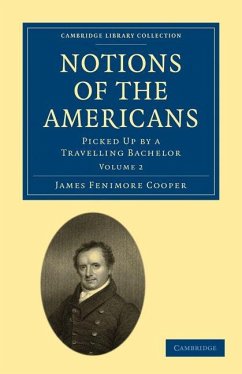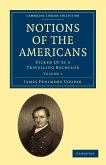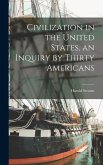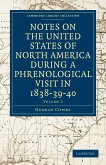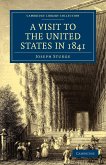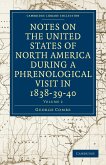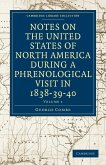- Broschiertes Buch
- Merkliste
- Auf die Merkliste
- Bewerten Bewerten
- Teilen
- Produkt teilen
- Produkterinnerung
- Produkterinnerung
A light-hearted narrative with the serious purpose of revealing the nature of this brand-new nation.
Andere Kunden interessierten sich auch für
![Notions of the Americans Notions of the Americans]() James Fenimore CooperNotions of the Americans52,99 €
James Fenimore CooperNotions of the Americans52,99 €![America And The Americans From A French Point Of View America And The Americans From A French Point Of View]() Price CollierAmerica And The Americans From A French Point Of View25,99 €
Price CollierAmerica And The Americans From A French Point Of View25,99 €![Civilization in the United States, an Inquiry by Thirty Americans Civilization in the United States, an Inquiry by Thirty Americans]() Harold StearnsCivilization in the United States, an Inquiry by Thirty Americans46,99 €
Harold StearnsCivilization in the United States, an Inquiry by Thirty Americans46,99 €![Notes on the United States of North America During a Phrenological Visit in 1838-39-40 - Volume 3 Notes on the United States of North America During a Phrenological Visit in 1838-39-40 - Volume 3]() George CombeNotes on the United States of North America During a Phrenological Visit in 1838-39-40 - Volume 357,99 €
George CombeNotes on the United States of North America During a Phrenological Visit in 1838-39-40 - Volume 357,99 €![A Visit to the United States in 1841 A Visit to the United States in 1841]() Joseph SturgeA Visit to the United States in 184146,99 €
Joseph SturgeA Visit to the United States in 184146,99 €![Notes on the United States of North America during a Phrenological Visit in 1838-39-40 - Volume 2 Notes on the United States of North America during a Phrenological Visit in 1838-39-40 - Volume 2]() George CombeNotes on the United States of North America during a Phrenological Visit in 1838-39-40 - Volume 246,99 €
George CombeNotes on the United States of North America during a Phrenological Visit in 1838-39-40 - Volume 246,99 €![Notes on the United States of North America during a Phrenological Visit in 1838-39-40 - Volume 1 Notes on the United States of North America during a Phrenological Visit in 1838-39-40 - Volume 1]() George CombeNotes on the United States of North America during a Phrenological Visit in 1838-39-40 - Volume 146,99 €
George CombeNotes on the United States of North America during a Phrenological Visit in 1838-39-40 - Volume 146,99 €-
-
-
A light-hearted narrative with the serious purpose of revealing the nature of this brand-new nation.
Hinweis: Dieser Artikel kann nur an eine deutsche Lieferadresse ausgeliefert werden.
Hinweis: Dieser Artikel kann nur an eine deutsche Lieferadresse ausgeliefert werden.
Produktdetails
- Produktdetails
- Verlag: Cambridge University Press
- Seitenzahl: 492
- Erscheinungstermin: 20. Juli 2009
- Englisch
- Abmessung: 216mm x 140mm x 29mm
- Gewicht: 688g
- ISBN-13: 9781108003865
- ISBN-10: 1108003869
- Artikelnr.: 26871130
- Herstellerkennzeichnung
- Libri GmbH
- Europaallee 1
- 36244 Bad Hersfeld
- gpsr@libri.de
- Verlag: Cambridge University Press
- Seitenzahl: 492
- Erscheinungstermin: 20. Juli 2009
- Englisch
- Abmessung: 216mm x 140mm x 29mm
- Gewicht: 688g
- ISBN-13: 9781108003865
- ISBN-10: 1108003869
- Artikelnr.: 26871130
- Herstellerkennzeichnung
- Libri GmbH
- Europaallee 1
- 36244 Bad Hersfeld
- gpsr@libri.de
James Fenimore Cooper (September 15, 1789 - September 14, 1851) was an American writer of the first half of the 19th century. His historical romances draw a picture of frontier and Native American life in the early American days which created a unique form of American literature. He lived most of his life in Cooperstown, New York, which was founded by his father William on property that he owned. Cooper was a lifelong member of the Episcopal Church and contributed generously to it. He attended Yale University for three years, where he was a member of the Linonian Society. Cooper served in the U.S. Navy as a midshipman, which greatly influenced many of his novels and other writings. The novel that launched his career was The Spy, a tale about counter-espionage set during the American Revolutionary War and published in 1821. He also wrote numerous sea stories, and his best-known works are five historical novels of the frontier period known as the Leatherstocking Tales. Cooper's works on the U.S. Navy have been well received among naval historians, but they were sometimes criticized by his contemporaries. Among his most famous works is the Romantic novel The Last of the Mohicans, often regarded as his masterpiece.
1. To the Count Jules de Bethizy
2. To the Abbate Giromachi
3. To the same
4. To the Count Jules de Bethizy
5. To the Baron von Kemperfelt
6. To the Abbate Giromachi
7. To the same
8. To the Count Jules de Bethizy
9. To the Professor Christian Jansen
10. To Sir Edward Waller, Bart.
11. To the same
12. To the Professor Jansen
13. To the Count Jules de Bethizy
14. To the Abbate Giromachi
15. To the Professor Christian Jansen
16. To Sir Edward Waller, Bart.
17. To the same
18. To the same
19. To the Count Jules de Bethizy
20. To the same
21. To Sir Edward Waller, Bart.
Notes.
2. To the Abbate Giromachi
3. To the same
4. To the Count Jules de Bethizy
5. To the Baron von Kemperfelt
6. To the Abbate Giromachi
7. To the same
8. To the Count Jules de Bethizy
9. To the Professor Christian Jansen
10. To Sir Edward Waller, Bart.
11. To the same
12. To the Professor Jansen
13. To the Count Jules de Bethizy
14. To the Abbate Giromachi
15. To the Professor Christian Jansen
16. To Sir Edward Waller, Bart.
17. To the same
18. To the same
19. To the Count Jules de Bethizy
20. To the same
21. To Sir Edward Waller, Bart.
Notes.
1. To the Count Jules de Bethizy
2. To the Abbate Giromachi
3. To the same
4. To the Count Jules de Bethizy
5. To the Baron von Kemperfelt
6. To the Abbate Giromachi
7. To the same
8. To the Count Jules de Bethizy
9. To the Professor Christian Jansen
10. To Sir Edward Waller, Bart.
11. To the same
12. To the Professor Jansen
13. To the Count Jules de Bethizy
14. To the Abbate Giromachi
15. To the Professor Christian Jansen
16. To Sir Edward Waller, Bart.
17. To the same
18. To the same
19. To the Count Jules de Bethizy
20. To the same
21. To Sir Edward Waller, Bart.
Notes.
2. To the Abbate Giromachi
3. To the same
4. To the Count Jules de Bethizy
5. To the Baron von Kemperfelt
6. To the Abbate Giromachi
7. To the same
8. To the Count Jules de Bethizy
9. To the Professor Christian Jansen
10. To Sir Edward Waller, Bart.
11. To the same
12. To the Professor Jansen
13. To the Count Jules de Bethizy
14. To the Abbate Giromachi
15. To the Professor Christian Jansen
16. To Sir Edward Waller, Bart.
17. To the same
18. To the same
19. To the Count Jules de Bethizy
20. To the same
21. To Sir Edward Waller, Bart.
Notes.

